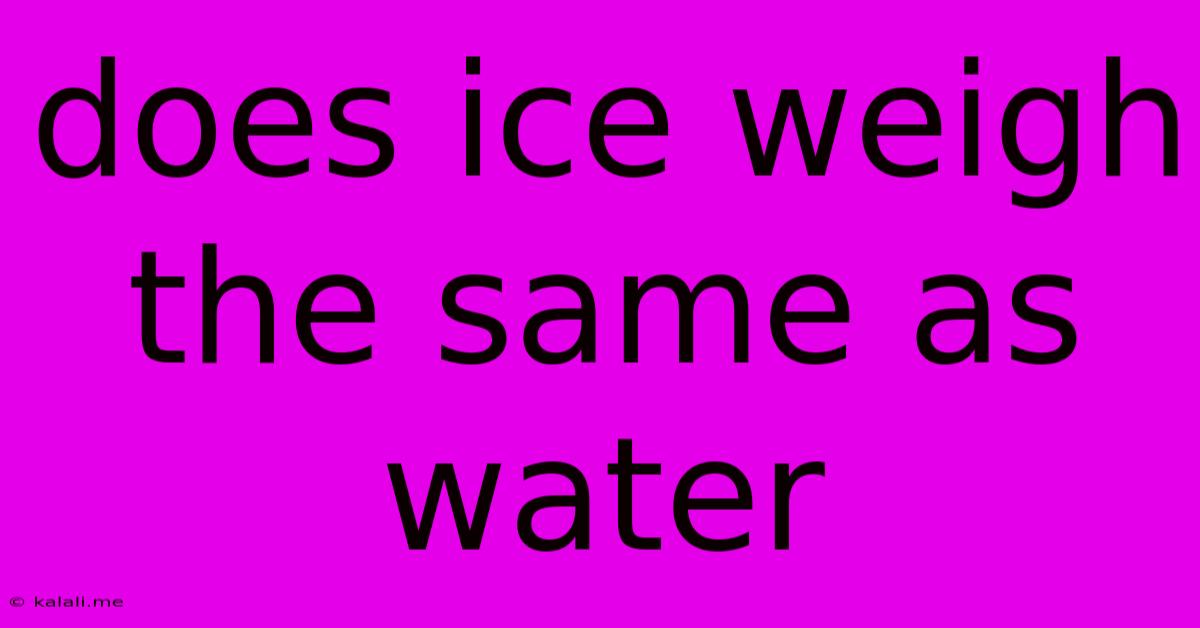Does Ice Weigh The Same As Water
Kalali
Jun 02, 2025 · 3 min read

Table of Contents
Does Ice Weigh the Same as Water? The Surprising Answer
Meta Description: Discover the fascinating truth about the weight of ice versus water. Learn about density, volume, and the surprising answer to this common question. We explain the science behind it in a simple, easy-to-understand way.
The simple answer is: no, ice does not weigh the same as an equal volume of water. While it might seem counterintuitive, this difference is all down to the concept of density and how water molecules behave when they freeze. This article will delve into the science behind this phenomenon, explaining it in clear and accessible terms.
Understanding Density
Density is a crucial factor here. Density is defined as mass per unit volume. Think of it as how tightly packed the molecules of a substance are. Water has a unique property: its density is highest at 4°C (39°F). As water cools further and freezes into ice, its density actually decreases.
This decrease in density means that the same mass of water will occupy a larger volume when it's frozen into ice. Therefore, a specific weight of water will take up more space as ice, but the mass (and therefore, weight) remains largely the same. The key difference lies in the volume.
The Molecular Structure of Ice
The reason for this density change lies in the way water molecules arrange themselves when they freeze. In liquid water, the molecules are relatively close together, moving freely. But when water freezes, the molecules form a crystalline structure with more space between them. This open crystalline structure is what makes ice less dense than liquid water.
Imagine a tightly packed crowd of people (liquid water). Now imagine those same people spreading out to form an orderly grid (ice). They take up more space, even though the total number of people (mass) remains the same.
The Implications of Ice's Lower Density
This difference in density has profound implications for life on Earth. Because ice is less dense than water, it floats. This means that lakes and rivers freeze from the top down, allowing aquatic life to survive beneath the icy surface during winter. If ice were denser than water, it would sink, potentially leading to the complete freezing of water bodies, with devastating consequences for aquatic ecosystems.
Why the Confusion?
The common misconception that ice and water weigh the same likely stems from our everyday experience. We often see ice cubes floating in water, and this visual observation might lead us to believe they have the same mass. However, it's important to remember that while the ice appears to displace an equal amount of water, the underlying principle is density, not weight.
In Conclusion
While the mass of water remains largely consistent when it freezes into ice, the volume increases due to the lower density of ice. This means an equal volume of ice will weigh less than an equal volume of water. Understanding density and the molecular structure of ice is key to grasping this fascinating phenomenon and its significant impact on our world.
Latest Posts
Latest Posts
-
Gradient Fill For Top Down Triangle
Jun 03, 2025
-
How To Remove From Reading List
Jun 03, 2025
-
Single Layer Decoder Only Language Model
Jun 03, 2025
-
Do Movie Titles Go In Quotes
Jun 03, 2025
-
Tony Stark Workshop Ironman Work Space
Jun 03, 2025
Related Post
Thank you for visiting our website which covers about Does Ice Weigh The Same As Water . We hope the information provided has been useful to you. Feel free to contact us if you have any questions or need further assistance. See you next time and don't miss to bookmark.